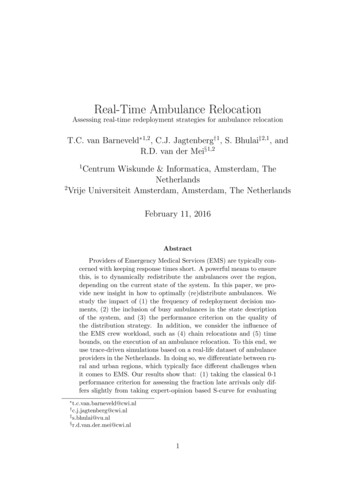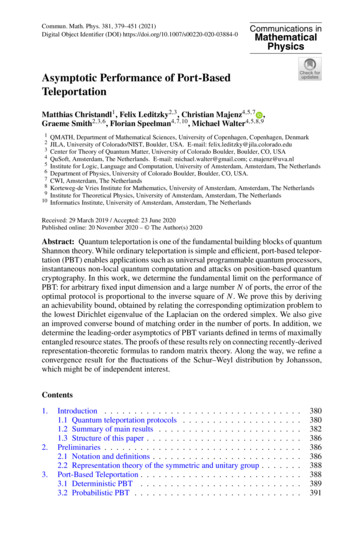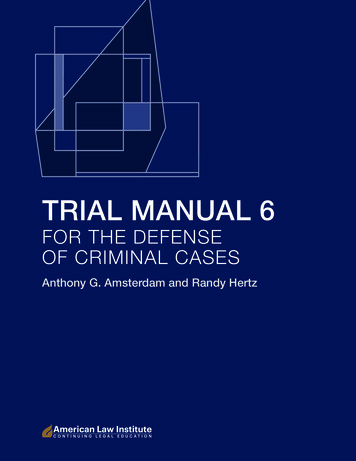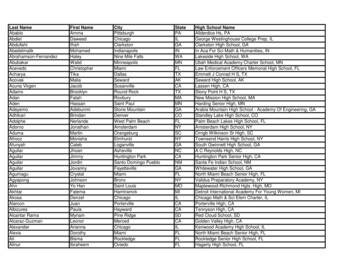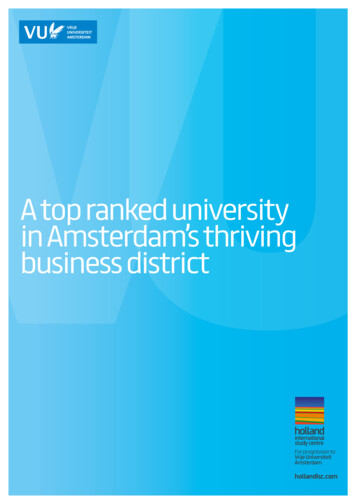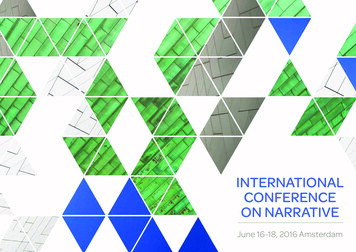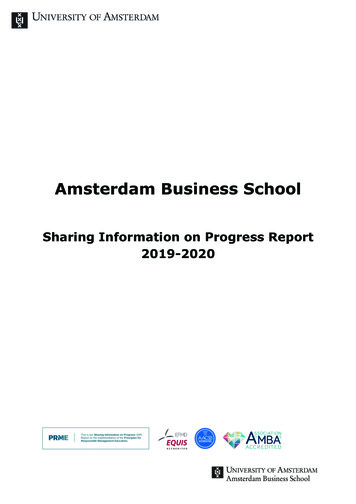
Transcription
Amsterdam Business SchoolSharing Information on Progress Report2019-2020
Table of contentsUniversity of Amsterdam Business School at a glance3Mission3Values3A word from the Dean4Preface4Assessment of outcomes5Principle 1: Purpose6Principle 2: Values7Principle 3: Method8Principle 4: Research9Principle 5: Partnership10Principle 6: Dialogue11Operations12Faculty & researchers13University of Amsterdam Business School – PRME Sharing Information on Progress Report2019/20 – Contact persons: Arno Kourula (A.E.Kourula@uva.nl) & Michelle WestermannBehaylo (m.k.westermann-behaylo@uva.nl)2
University of Amsterdam Business SchoolAt a glancev A research-based business school with a strong focus on business ethics, corporateresponsibility and sustainabilityv Highly internationalised (49% of all faculty (full and part-time) is non-Dutch, with 36different nationalities and students from 99 different countries)v Embedded in a broad-based research-driven university with a strong internationalreputationv A strong portfolio of bachelor, master, doctoral and executive programmesMissionAt the Amsterdam Business School, we guarantee scientific research and business andmanagement education that has societal impact and high quality. We offer an inspiringand leading internationally-oriented academic community with a strong believe in keyvalues like open mindedness, independence, critical thinking, balancing ourentrepreneurial attitude with corporate engagement and social responsibility. We takeour learners seriously and are committed to encourage them to develop their professionaland personal capacities to their full potential, aiming for excellence.Valuesv Excellencev Critical thinkingv Social engagementv EntrepreneurialUniversity of Amsterdam Business School – PRME Sharing Information on Progress Report2019/20 – Contact persons: Arno Kourula (A.E.Kourula@uva.nl) & Michelle WestermannBehaylo (m.k.westermann-behaylo@uva.nl)3
A word from the DeanAt Amsterdam Business School, we strive to integrate ethics, responsibility andsustainability into all our teaching programs, research endeavours, engagement withstakeholders, and operations of the university. In all these areas we have achieved manysuccesses in the past two years and have a recognized profile in these topics both inEurope and globally. Our students yearn to explore the themes of ethics, responsibilityand sustainability and want to put them into practice. Our growing faculty tackles arange of topics within this field leading to world class research. Increasingly the field ofethics, responsibility and sustainability comes closer to the fields and practice ofentrepreneurship and analytics, making ABS a hub of knowledge and expertise in thesekey future trends. The Principles of Responsible Management Education acts as anintegrator and guiding framework for our activities and helps us set goals for ourbusiness school and the impact we want to see in the world.Marc Salomon, Dean University of Amsterdam Business SchoolPrefaceIn this report we present our recent developments related to responsible managementeducation, building on our previous progress reports. We take an inclusive approach tothe theme of responsible management education meaning that we cover a range of topicareas related to business ethics, corporate responsibility, corporate sustainability, thustaking into consideration individual ethical decision-making, programs and practicesrelated to organizational responsibilities, as well as broader societal impact andsustainable development.We highlight some key new developments and point out some challenges that lay aheadand opportunities that still have not been taken. We should note that many elementsremain unchanged from previous progress reports and we obviously build on our fairlyextensive past efforts. Our key aim has been to integrate ethics, responsibility andsustainability into all our activities in a context-dependent way, meaning that theuniversity and broader institutional context in part shapes our approach. Some relevantpolicies that we adhere to are either formulated at the university level (ABS is part of alarger University of Amsterdam) or at the national level. The following websitessummarize our ethics, responsibility and sustainability efforts:v Ethics, Responsibility and Sustainability at Amsterdam Business Schoolv Sustainability at the University of AmsterdamUniversity of Amsterdam Business School – PRME Sharing Information on Progress Report2019/20 – Contact persons: Arno Kourula (A.E.Kourula@uva.nl) & Michelle WestermannBehaylo (m.k.westermann-behaylo@uva.nl)4
Assessment of outcomesIn this section, we present a short assessment of perspectives and plans, linking back toour previous report.Principle 1: PurposevImplement a school-wide strategy for integrating the principles in all existingprogrammes. [Continued]Principle 2: ValuesvIntegrate ethics, responsibility and sustainability into all programs. [Continued]Principle 3: MethodvInform our students of our initiatives in research and teaching regarding corporateresponsibility. [Continued]Principle 4: ResearchvLaunch of new research priority areas related to ethics, responsibility andsustainability themes. [To be implemented]Principle 5: PartnershipvDevelop new innovative partnerships in the area of the PRME principles.[Continued and to be implemented].Principle 6: DialoguevContinuing to contribute to new and existing dialogues. [Continued]University of Amsterdam Business School – PRME Sharing Information on Progress Report2019/20 – Contact persons: Arno Kourula (A.E.Kourula@uva.nl) & Michelle WestermannBehaylo (m.k.westermann-behaylo@uva.nl)5
Principle 1: PurposeWe will develop the capabilities of students to be future generators of sustainable valuefor business and society at large and to work for an inclusive and sustainable globaleconomy.OverviewThe mission and vision of Amsterdam Business School explicitly refer to societalengagement, responsibility and impact. We take this mission and our vision veryseriously through particular attention to ethics, responsibility and sustainability inresearch, education and outreach activities. Amsterdam Business School has beenworking on these issues since its inception.Achievements/ActivitiesvvvvvIntegration of ethics, responsibility and sustainability across all teaching programsand the explicit mention of these themes in learning objectives and outcomes.Launch of a dedicated Honours programme Sustainability.Award-winning specialized courses developed in partnership with companies,public sector organizations and social entrepreneurship networks.Larger sustainability themed events and prestigious awards for students.Continuous hiring of tenure track and permanent faculty who combine a thoroughknowledge of at least one business discipline with a focus on or interest in ethics,responsibility and sustainability.Future perspectivesvContinue implementing a school-wide strategy related to integrating ethics,responsibility and sustainability into all our activities.University of Amsterdam Business School – PRME Sharing Information on Progress Report2019/20 – Contact persons: Arno Kourula (A.E.Kourula@uva.nl) & Michelle WestermannBehaylo (m.k.westermann-behaylo@uva.nl)6
Principle 2: ValuesWe will incorporate into our academic activities and curricula the values of global socialresponsibility as portrayed in international initiatives such as the United Nations GlobalCompact.OverviewThe themes of ethics, responsibility and sustainability are well integrated in our teachingat ABS. We have included compulsory courses for bachelor, master, all MBA and parttime executive programs as well as several specialized courses in the master’s programand in executive education (see principle 3 on method for more specific information). Thethemes feature prominently in our broader seminar series (see also principle 6 ondialogue for more specific information).Similarly, the themes are also integrated into our research foci and processes. Severalscholars study these topics, either as a primary or secondary focal area (see full list ofrelevant faculty at the end of the report). New faculty receive the Netherlands Code ofConduct for Scientific Practice at the beginning of their employment. Research ethics andresponsibility has been clearly defined both in policy and practice and both at theuniversity and business school levels. For the research ethics and data managementpolicies, see website.In all our interactions and actions, we aim to exemplify our values of critical thinking andsocial engagement. Our efforts of incorporating global social responsibility in a systematicway are led by two Co-Directors of the Sustainability Initiative of ABS.Achievements/ActivitiesvvvvContinuation of fairly extensive offering of specialized teaching as well asintegration of themes in all teaching programs.Continuation of communication to students and lecturers about ethics,responsibility and sustainability interest through our website, newsletters, eventsand direct emails. Information made available on ethics, responsibility andsustainability website.Development of research ethics and responsibility policy and finalizing ethicalapproval, research data management, and privacy law related processes.Systematic approach to implementing PRME guidelines by two Co-Directors of theSustainability Initiative of ABS.Future perspectivesvContinue the integration of ethics, responsibility and sustainability into allprograms.University of Amsterdam Business School – PRME Sharing Information on Progress Report2019/20 – Contact persons: Arno Kourula (A.E.Kourula@uva.nl) & Michelle WestermannBehaylo (m.k.westermann-behaylo@uva.nl)7
Principle 3: MethodWe will create educational frameworks, materials, processes and environments thatenable effective learning experiences for responsible leadership.OverviewAs already mentioned in the previous section, ABS has both mandatory and specializedcourses in ethics, responsibility and sustainability as well as specialized dedicatedprograms. These courses are highly popular at BSc, MSc and MBA levels. In our full-timeMSc in Business Administration program, all track coordinators have aimed to integratethese topics in all courses.We approach ethics, responsibility and sustainability in a contextualized way, meaningthat the content and methods are adapted to the specific topic or focus (e.g. relatedstrategy courses use different approaches than for instance entrepreneurship courses).In the past, our faculty members that teach these topics have received several awardsincluding the lecturer of the year in the faculty of economics and business, MBA lecturerof the year awards and executive (part-time) programme lecturer of the year.Achievements/ActivitiesvvvvvvvvvAcross our different programs, we offer approximately 30 different coursesdedicated to ethics, responsibility and sustainability themes and a large number ofcourses where these themes are integrated into other topic areas.All regular BSc and MSc educational programmes have dedicated objectivesrelated to the ability to cope with ethical dilemmas in their final qualifications.Our BSc Business Administration has compulsory courses on ‘Business Law &Ethics’ and ‘Corporate Social Responsibility’.Our MSc in Accountancy and control has a course on ‘Accountability & RiskManagement’, our MSc in Entrepreneurship has a course on ‘SocialEntrepreneurship’, our MSc in Finance has a course on ‘Ethics and ProfessionalSkills in Finance’.In addition to a new mandatory ethics, responsibility and sustainability coursereintroduced in 2021 (‘Ethics and the Future of Business’), we offer severalelective courses at the master’s level. Our elective courses use a business labformat, where students work together with companies, public sector and civilsociety organizations on real life challenges and PRME relevant topics. Examplesof MSc electives include the following courses: ‘Business Strategy andSustainability’, ‘International Business and Sustainable Development’, and‘Sustainable and Ethical Marketing’.Addressing big social themes (sustainability, climate change, equality, ethics,digitization) is no longer considered a unique selling point but a must-have for allour executive programmes and other commercial offerings. The part timeexecutive program Business Administration (EPMS) has a compulsory ‘Business inSociety’ course. Our full-time three MBA programs have courses on ‘Ethics,Responsibility and Sustainability’ and ‘Conscious Marketing’ (MBA in generalmanagement), ‘Law & Ethics for Big Data’ (MBA in big data), and ‘Ethics andSustainability in Healthcare’ (MBA in healthcare).ABS faculty members also participate actively in teaching in the cross-disciplinaryminor ‘Sustainability and Economics’ and bachelor program ‘Future PlanetStudies’.A full list of courses is available via the ethics, responsibility and sustainabilitywebsite.Our PRME relevant courses have received several (university internal) teachingawards.University of Amsterdam Business School – PRME Sharing Information on Progress Report2019/20 – Contact persons: Arno Kourula (A.E.Kourula@uva.nl) & Michelle WestermannBehaylo (m.k.westermann-behaylo@uva.nl)8
vIn 2020, we launched a highly selective dedicated Honours programmeSustainability on top of the master’s program for 25 accomplished and ambitiousstudents. This co-created program involves two tailor-made courses and twopractical projects with business, municipal, and civil society and internationaluniversity partners.Future perspectivesvWe aim to strike a balance between top down coordination of ethics, responsibilityand sustainability and creative and innovative bottom-up approaches acrossprograms and sections. We will continue to offer and develop a range of coursesand dedicated programs.University of Amsterdam Business School – PRME Sharing Information on Progress Report2019/20 – Contact persons: Arno Kourula (A.E.Kourula@uva.nl) & Michelle WestermannBehaylo (m.k.westermann-behaylo@uva.nl)9
Principle 4: ResearchWe will engage in conceptual and empirical research that advances our understandingabout the role, dynamics, and impact of corporations in the creation of sustainable social,environmental and economic value.OverviewABS is a global hub for research on the broad themes of ethics, responsibility andsustainability in and of corporations. Several top academic peer review publications onthese themes appear annually and faculty members are very active in relevant academicjournals, conferences and societies. Research on business ethics, corporate responsibility,and sustainability have been areas of specific interest at ABS for some time. We have asignificant number of core faculty members and PhD students whose research is fullyfocused on these themes, while many others have a vivid interest in related aspects.Achievements/ActivitiesvvvvvvvThe University of Amsterdam Business School is ranked by the Financial Times inthe Top 10 European business school’s publishing on the Sustainable DevelopmentGoals (SDGs): Link to article.ABS employs about 50 faculty members or doctoral students focusing on ethics,responsibility and sustainability. A full list of scholars working on PRME relevantthemes are listed at the end of the report. Examples of recent hires (2019-2020)include Prof.dr. Dick den Hertog, Asst. Prof. Armin Pircher Verdorfer, and Asst.Prof. Carina Thuerridl.ABS has a strong track record of high quality publications related to the topic aswell as several faculty members with expertise in the field who have editorial rolesin leading mainstream and specialized journals and/or management roles incentral academic societies.Recent PhD theses relevant to PRME themes include Hannah Berkers on employeeell-being, Sofija Pajic on sustainable careers, Katinka Quintelier on microfoundations of stakeholder theory, and Binqi Tang on time and corporate socialresponsibility.ABS faculty are involved in several on-going research projects related tosustainable social, environmental and economic value, broadly speaking.Examples of recent successes in external funding include Dutch Research Councilfunded projects on sustainable business models, circular economy, moral markets,and responsible AI.Several initiatives related to PRME principles cross disciplinary boundaries, such asA Sustainable Future platform providing research seed funding and theAmsterdam Centre for European Studies which includes strong elements ofsustainability and diversity.The Faculty of Economics and Business (which houses ABS) has launched thefollowing research priority areas: 1) Sustainability and Environmental Economics,2) Responsible digital transformations, 3) Resilient society and stability, 4)Nudging for a better world.Future perspectivesvvvvContinue our active research and publication work on PRME-relevant themes.Participate in and promote relevant interdisciplinary university initiatives.Apply for further external funding for projects aiming at sustainable social,environmental and economic value.Launch of new research priority areas related to ethics, responsibility andsustainability themes.University of Amsterdam Business School – PRME Sharing Information on Progress Report2019/20 – Contact persons: Arno Kourula (A.E.Kourula@uva.nl) & Michelle WestermannBehaylo (m.k.westermann-behaylo@uva.nl)10
Principle 5: PartnershipWe will interact with managers of business corporations to extend our knowledge of theirchallenges in meeting social and environmental responsibilities and to explore jointlyeffective approaches to meeting these challenges.OverviewPartnerships are central to achieving the United Nations Sustainable Development Goals.In the past two years, we have built on existing relationships and developed several newpartnerships with companies and other organizations. Partnering takes place withcompanies as well as universities, non-profit organizations and the public sector in areasof research, teaching and societal engagement. In the below achievements and activities,we list several examples of deep interaction with managers.Achievements/ActivitiesvvvvvvvWe have developed several partnerships with companies around themes of ethics,responsibility and sustainability. Examples of recent integration efforts intocourses include students exploring the developing new sustainability approacheswith Patagonia, Philips, Unilever, VodafoneZiggo, or new social entrepreneurialventures.We have organized an annual George Molenkamp Sustainability Thesis Awardsponsored by KPMG since 2017.The Honours Program Sustainability has a prestigious Sustainability board withcorporate and municipal leaders in the field.Every year, a large number of students undertake master’s theses related toethics, responsibility and sustainability in collaboration with public, corporate andnon-profit organizations.Interaction also takes place through inviting public, corporate and non-profitsector speakers into our classes. In addition, a large number of our part-time andfull-time executive and MBA programs work for companies, which offers ampleopportunities for engagement.National and international research collaboration with companies, invited speechesat companies for our professors, as well as other forms of exchange are alsocommon.We have a common program with IT DEL in North-Sumatra, Indonesia, to developtheir business curriculum and prepare selected students for the MSc BusinessAdministration.Future perspectivesvContinue and solidify existing partnerships and develop new ones.University of Amsterdam Business School – PRME Sharing Information on Progress Report2019/20 – Contact persons: Arno Kourula (A.E.Kourula@uva.nl) & Michelle WestermannBehaylo (m.k.westermann-behaylo@uva.nl)11
Principle 6: DialogueWe will facilitate and support dialog and debate among educators, students, business,government, consumers, media, civil society organisations and other interested groupsand stakeholders on critical issues related to global social responsibility andsustainability.OverviewABS participates in and organizes several initiatives and forums for dialogue. Wehighlight here two types of forums for dialogue: UvA in Carré and Room for Discussion.UvA in Carré is a seminar series for all master’s students across different programs tocome together at the Royal Theatre Carré in Amsterdam to hear the latest thinking oncritical societal and business issues. Several of the seminars in the series deals withglobal social responsibility and sustainability with invited guests ranging from largecompanies’ sustainability experts to social entrepreneurs changing the rules of the game.In the spirit of critical thinking, our students get to challenge the approach of theseexperts. Another prominent initiative has been the so-called Room for Discussion, a biweekly debate on various topics with academics, politicians, policy-makers, top managersand civil society representatives.Much of ABS’ societal dialogue is driven by our students. The students of the universityare very active in organizing a range of relevant events and forums, including throughStudents for Sustainability Amsterdam (SFSA), a student association committed tosustainability for students of the University of Amsterdam, and the UvA Green Office.Many faculty and staff members are also active in national and international meetings toengage in in-depth conversations with academic and particularly non-academic audiencesas well. ABS is an active member of networks such as the Academy of Business inSociety (ABIS) and the Network for Business Sustainability (NBS). Lastly ABS has beenan active founding member since 2017 of the Benelux-France chapter of PRME.Achievements/ActivitiesvvvvActive participation since in the founding of the regional PRME chapter forBenelux-France.Continuation of the successful ‘Room for Discussion’ to provide students and thewider public insight from academics and high ranking business and politicalleaders typically dealing with broad topics related to the role of business insociety.Central role of ethics, responsibility and sustainability themes in the prominentUvA in Carré seminar series.Engagement with student associations and UvA Green Office in a dialogue aboutglobal social responsibility and sustainability.Future perspectivesvContinue to contribute to new and existing dialogues.University of Amsterdam Business School – PRME Sharing Information on Progress Report2019/20 – Contact persons: Arno Kourula (A.E.Kourula@uva.nl) & Michelle WestermannBehaylo (m.k.westermann-behaylo@uva.nl)12
OperationsIn this section we will provide information on development within our university, assustainability in operational management (in relation to facilities) is coordinated at theUniversity level, as well the national and institutional context. For more detailedinformation UvA has a dedicated website, which also makes available the university’sannual environmental report. From sustainable buildings and logistics to eco-consciousprinting and movement sensors, the UvA is working to make its operations sustainable.The University has adopted a sustainable approach to construction, buildingmanagement, energy management, transportation, purchasing and consumption.Achievements/ActivitiesvvvvvvvUva published a white paper on sustainability laying out the strategy of theuniversity.Sustainability policies and targets include a 2% annual reduction in energyconsumption (relative to 2005) and a 3% annual reduction in the CO2-emissionsfrom UvA buildings (relative to 2010). Over the 2005-2016 period, our primaryenergy consumption per student dropped by 31%, a major improvement.We are reducing energy use by improving the energy characteristics of ourbuildings during maintenance, renovations and new construction efforts. Allrenovation and new construction work aims at energy efficiency levels that exceedmandatory targets by 10%.In terms of generating our own sustainable energy supply, we have installed solarpanels on buildings at the Amsterdam Business School, the Faculty of Science andAmsterdam University College, among others.Reductions of CO₂ emissions per student have already been achieved throughvarious energy efficiency measures including transitioning to 100% Dutch windpower.Our campuses serve as a testing ground for sustainable innovations. Working withlocal government and businesses, the UvA is carrying out an original andambitious series of sustainability projects. Some examples:oFrom 1 January 2020, all utility buildings in the Netherlands must meet therequirements for ‘nearly Zero Energy Buildings’. The UvA strives to meet orsurpass these requirements in its new buildings and renovation work. Forexample, at Amsterdam Science Park, the UvA is constructing a new, energyneutral building to house Informatics.oA logistics hub has been set up for efficient, sustainable delivery of supplies toUvA and Amsterdam University of Applied Sciences.Founded in 2016, UvA Green Office organizes a range of programs, projects,events and trainings related to sustainability.Future perspectivesvIn addition to the above-mentioned targets, several projects are under way. Someexamples: A) We are working to apply government criteria for sustainableprocurement, including social procurement, and we regularly exchangeinformation on sustainable procurement with other higher education institutions.B) At the UvA we want to separate waste in a different, more sustainable way.2020 was a testing period to see what the best approach is and these findings willbe implemented in the coming years. C) We are working with the municipality todevelop an underground heat and cold storage system that will reduce CO2emissions by the University and its urban partners.University of Amsterdam Business School – PRME Sharing Information on Progress Report2019/20 – Contact persons: Arno Kourula (A.E.Kourula@uva.nl) & Michelle WestermannBehaylo (m.k.westermann-behaylo@uva.nl)13
Faculty & PhD studentsExamples of faculty members (and selected relevant topics/lenses towards PRMEthemes) and PhD students who are active in areas related to PRME or address ethics,responsibility and/or sustainability as one of the topics in their wider research 34.35.36.37.38.Dr. Aleksandar Andonov (Associate professor): Institutional investors, assetmanagement.Prof.dr. Frank Belschak (Full professor): Ethical leadership.Dr. Sanjay Bissessur (Assistant professor): Earnings management.Dr. Siri Boe-Lillegraven (Assistant professor): Inter-firm collaboration, strategicforesight.Prof.dr. Arnoud Boot (Full professor): Corporate governance and financial markets.Kayleigh Bruijn (PhD student): Civil society and business, climate change.Dr. Niek Brunsveld (Lecturer): Research, innovation and sustainability.Robert Bwana (PhD student): Crowdsourcing, responsible production.Dr. Guido van Capelleveen (Assistant Professor): Business analytics and data mining,circularity and sustainability.Eugénie Coche (PhD student): Information security-privacy-ownership nexus.Prof.dr. Willemijn van Dolen (Full professor): CSR and marketing.Dr. Martijn Dröes (Associate professor): Home ownership, renewable energy.Dr. Georgios Georgakopoulos (Assistant professor): Social and environmentalaccount reportingDr. Panikos Georgallis (Assistant Professor): Moral markets and renewable energy.Ioan Gheorghe Ivănescu (PhD student): Audit quality.Dr. Bianca Groen (Assistant professor): Employee participation.Prof.dr. Deanne den Hartog (Full professor): Ethical leadership.Dr. Ilir Haxhi (Associate professor): Strategy and corporate governance.Dr. Tanja Hentschel (Assistant professor): Diversity, gender issues.Prof.dr. Dick den Hertog (Professor): Optimization with machine learning, analyticsfor a better world.Dr. Annebel de Hoogh (Associate professor): Ethical leadership.Dr. Gijs van Houwelingen (Assistant professor): Moral behaviour.Dr. Torsten Jochem (Associate professor): Governance and (local) democracy.Prof.dr. Ans Kolk (Full professor): Corporate responsibility and sustainability ininternational business.Dr. Sebastian Kortmann (Associate professor): Strategy, innovation, co-creation andsustainability.Dr. Arno Kourula (Associate professor): Corporate responsibility and sustainability.Parvathy Krishnan (external PhD student): Data for Sustainable and ResilientDevelopment.Dr. Tomislav Ladika (Assistant professor): CEO pay, corporate governance.Dr. François Lenfant (Postdoctoral researcher): Business, peace and conflict areas.Donato Maragno (PhD student): Optimisation, machine learning.Dr. Frauke Mattison (Assistant professor): Privacy issues.Dr. Sadaf Mokarram Dorri (Assistant Professor): Consumer behaviour.Dr. Stefan Mol (Assistant professor): Organizational Behaviour and ResearchMethods.Danique de Moor (PhD student): Hard minimization problems, optimal food supplychain.Václav Ocelík (PhD student): Environmental sustainability and cities.Prof.dr. Brendan O'Dwyer (Full professor): Corporate and NGO auditing andaccountability.Prof.dr. Sander Onderstal (Full Professor): Auctions, Industrial Organization,behavioural economics.Melanie O'Neill-van der Lem (PhD student): Business and peacebuilding.University of Amsterdam Business School – PRME Sharing Information on Progress Report2019/20 – Contact persons: Arno Kourula (A.E.Kourula@uva.nl) & Michelle WestermannBehaylo (m.k.westermann-behaylo@uva.nl)14
.56.57.58.59.Prof.dr. Alessio Pacces (Full professor): Sustainable corporate governance.Sofija Pajic (Postdoctoral researcher): Refugees at work.Dr. Markus Paukku (Lecturer): Inter-organizational alliances and sustainability.Prof.dr. Enrico Perotti (Full professor): Corporate governance and corporate finance.Dr. Armin Pircher Verdorfer (Assistant professor): Leadership, leadershipdevelopment, ethical l
University of Amsterdam Business School - PRME Sharing Information on Progress Report 2019/20 - Contact persons: Arno Kourula (A.E.Kourula@uva.nl) & Michelle Westermann- . v A strong portfolio of bachelor, master, doctoral and executive programmes Mission At the Amsterdam Business School, we guarantee scientific research and business and .

